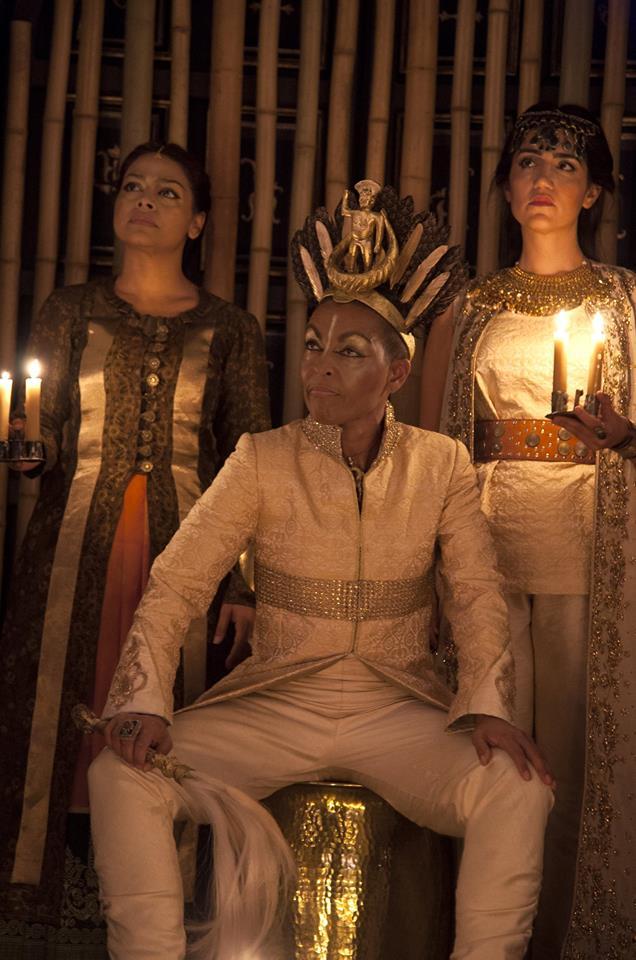
Richard II hands over the crown to a usurper, and the now-deposed monarch asks for a mirror. ‘That it may show me what a face I have.’ In the new production at the Sam Wanamaker Playhouse at the Globe, the glass is a rectangle, size of an i-pad. Richard takes it in both hands and looks, long and hard.
What face does Richard see? Not, as in virtually any previous production, the face of a white man, one of a rarely-broken chain trudging back to the play’s premiere in 1595. But, this time, the face of a black woman, Adjoa Andoh. What does it mean to see that face?
During the past two decades, black actors cast as kings have helped change the mood music on the British stage. There’s something about the twin sacrosancturies of Shakespeare and English royalty that resonated when David Oyelowo played Henry VI at the RSC (in 2000, followed by Chuk Iwuji in revival) and Adrian Lester was Henry V at the National three years later, taking on a role suffused with British pluck since Olivier’s Wehrmacht-baiting film. If the national pageant can be claimed, they seemed to argue, everything is up for grabs.
And now, almost 20 years on, Andoh and Lynette Linton co-direct the first British production of a Shakespeare play entirely performed by women of colour. It’s another landmark that feels almost inevitable.
What does it mean to have Andoh playing Richard? Nothing and everything. Nothing because, surrounded by women of colour, her Richard isn’t an exception. Every bloke in this bloke-laden drama is played by a woman, All the dead white dudes are resurrected by people of colour. A ruler, played by one black woman, gives way to a usurper played by another black woman (Sarah Niles’ sturdy Bolingbroke). Bracingly, in an instant, this all becomes the new normal. The auditorium is hung with photos of the cast’s female forbears – grannies and aunties in excelsis – which rewrites heritage drama in a stroke. (The gorgeous design, with costumes simply glowing in the candlelight, is by Rajha Shakiry – photo above by Ingrid Pollard.)
Which also means here is that no actor feels any need to serve as ambassador for their character. So often, in trad Shakespeare, the actor playing Ophelia or Imogen or (good luck with this one) Miranda will talk about how she’s actually a really strong female character, as if to stake her ground amid a sea of bloke. But here, the cast don’t have to be advocates. The effect has an almost satirical edge, as they don’t need to coddle the entitled mighty or squabbling second-raters, testy with testosterone. My favourite may be Indra Ové as both a piratical Mowbray and a vindictive Northumberland – unscrupulous power players both.
But Andoh’s Richard is everything. Female actors often hymn the new expressive opportunities they get when cast as classical male leads – apart from anything else, the chance to carry the brimming weight of a story from first to last. For actors of colour, it’s even rarer. ‘You don’t get the same opportunities, it’s just plain,’ Cecilia Noble said in a recent interview. ‘There’s no denying that my counterparts have probably played hundreds of leads whereas I don’t think I’ve ever been seen for a lead on TV.’ I don’t think I’ve ever seen Andoh hold the centre of a play (though she’s recently been witheringly focus-pulling in Julius Caesar, at both the RSC and Bridge Theatre, and Leave Taking).
The face in the mirror is just the start of this story
So to see and hear Andoh let rip at a flawed protagonist, using the full extent of her extraordinary voice, is thrilling. She can snap, sing, croon, roar, ricochet through Richard’s lambent verse. This is one Shakespeare show where you leave wishing you could buy the cast album.
And it may be inspiring for hers to be the face in Richard’s mirror, but she doesn’t give him any quarter. In his pomp, Andoh’s Richard arrives with a derisive bark, and messes with his courtiers’ lives with wide-eyed delight. He’s mocking, mean, even cruel. I’ve also never noticed before how venal Richard is – a lot of the complaints about him are financial, and Andoh and Linton bring his avarice to the fore. A scene with his queen has them both in the counting-house, weighing out dubiously-gotten gains. Richard plays a contemptuously high-risk game, and Andoh shows us why he’s bound to lose.
So, when power is gone, Richard is bewildered by his reflection. ‘Was this the face/ That like the sun did make beholders wink?’ The monarch’s ‘brittle glory’ lost, Andoh breaks the mirror – not on the ground, as usual, but by smashing it on her forehead. The face destroys its own reflection, and a whole range of ideas deepen the role, a new palette of colours enters her voice. The face in the mirror is just the start of this story.
Propwatch previously on Richard II
Follow David on Twitter: @mrdavidjays

Leave a Reply